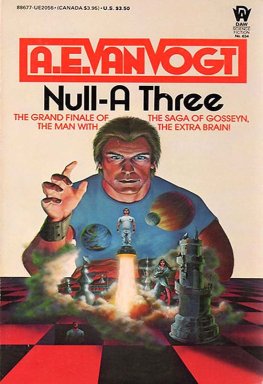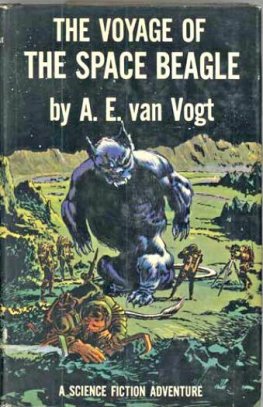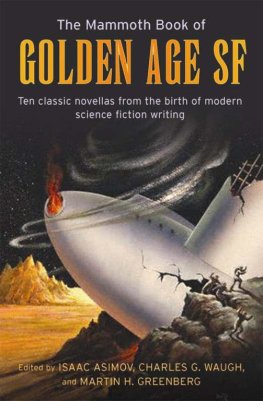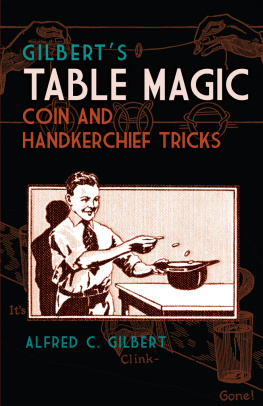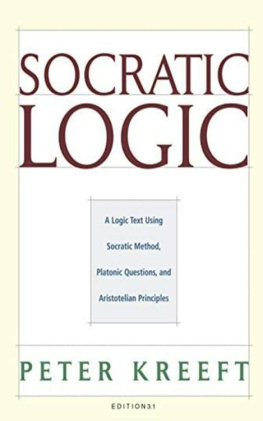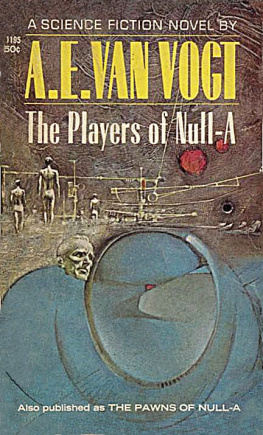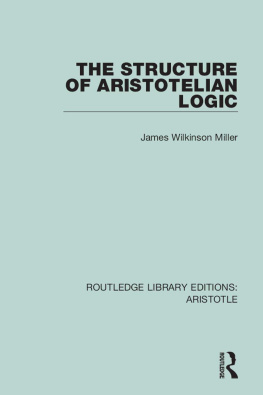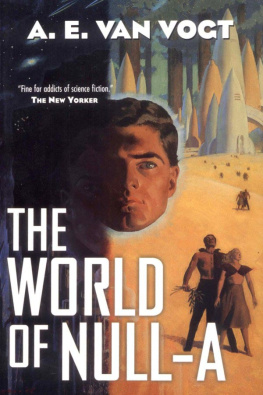Alfred van Vogt - The World of Null-A
Here you can read online Alfred van Vogt - The World of Null-A full text of the book (entire story) in english for free. Download pdf and epub, get meaning, cover and reviews about this ebook. genre: Science fiction. Description of the work, (preface) as well as reviews are available. Best literature library LitArk.com created for fans of good reading and offers a wide selection of genres:
Romance novel
Science fiction
Adventure
Detective
Science
History
Home and family
Prose
Art
Politics
Computer
Non-fiction
Religion
Business
Children
Humor
Choose a favorite category and find really read worthwhile books. Enjoy immersion in the world of imagination, feel the emotions of the characters or learn something new for yourself, make an fascinating discovery.

- Book:The World of Null-A
- Author:
- Genre:
- Rating:3 / 5
- Favourites:Add to favourites
- Your mark:
- 60
- 1
- 2
- 3
- 4
- 5
The World of Null-A: summary, description and annotation
We offer to read an annotation, description, summary or preface (depends on what the author of the book "The World of Null-A" wrote himself). If you haven't found the necessary information about the book — write in the comments, we will try to find it.
The World of Null-A — read online for free the complete book (whole text) full work
Below is the text of the book, divided by pages. System saving the place of the last page read, allows you to conveniently read the book "The World of Null-A" online for free, without having to search again every time where you left off. Put a bookmark, and you can go to the page where you finished reading at any time.
Font size:
Interval:
Bookmark:
The World of Null-A
Alfred Elton van Vogt
Author's Introduction
Reader, in your hands you hold one of the most controversialand successfulnovels in the whole of science fiction literature.
In these introductory remarks, I am going to tell about some of the successes and I shall also detail what the principal critics said about The World of Null-A. Let me hasten to say that what you shall read is no acrimonious defense. In fact, I have decided to take the criticisms seriously, and I have accordingly revised this first Berkley edition and have provided the explanations which for so long I believed to be unnecessary.
Before I tell you of the attacks, I propose swiftly to set down a few of The World of Null-A's successes:
It was the first hard-cover science fiction novel published by a major publisher after World War II (Simon and Schuster, 1948).
It won the Manuscripters Club award.
It was listed by the New York area library association among the hundred best novels of 1948.
Jacques Sadoul, in France, editor of Editions OPTA, has stated that World of Null-A, when first published, all by itself created the French science fiction market. The first edition sold over 25,000 copies. He has stated that I am stillin 1969the most popular writer in France in terms of copies sold.
Its publication stimulated interest in General Semantics. Students flocked to the Institute of General Semantics, Lakewood, Connecticut, to study under Count Alfred Korzybskiwho allowed himself to be photographed reading The World of Null-A. Today, General Semantics, then a faltering science, is taught in hundreds of universities.
World has been translated into nine languages.
With that out of the way, we come to the attacks. As you'll see, they're more fun, make authors madder, and get readers stirred up.
Here is what Sam Moskowitz, in his brief biography of the author, said in his book, Seekers of Tomorrow, about what was wrong with World of Null-A: . . . Bewildered Gilbert Gosseyn, mutant with a double mind, doesn't know who he is and spends the entire novel trying to find out. The novel was originally printed as a serial in Astounding Science Fiction, and after the final installment was published (Mr. Moskowitz continues), Letters of plaintive puzzlement began to pour in. Readers didn't understand what the story was all about. Campbell [the editor advised them to wait a few days; it took that long, he suggested, for the implications to sink in. The days turned into months, but clarification never came
You'll admit that's a tough set of sentences to follow. Plain, blunt-spoken Sam Moskowitz, whose knowledge of science fiction history and whose collection of science fiction probably is topped only by that of Forrest Ackerman (in the whole universe) . . . is nevertheless in error. The number of readers who wrote plaintive letters to the editor can be numbered on the fingers of one and a half hands.
However, Moskowitz might argue that it isn't the quantity of complainers, but the quality. And there he has a point.
Shortly after The World of Null-A was serialized in 1945, a sci-fi fan, hitherto unknown to me, wrote in a science fiction fan magazine a long and powerful article attacking the novel and my work in general up to that time. The article concluded, as I recall it (from memory only) with the sentence: Van Vogt is actually a pygmy writer working with a giant typewriter.
The imagery throughout this article, meaningless though that particular line is (if you'll think about it), induced me to include in my answering article in a subsequent issue of the same fan magazinewhich article is lost to posteritythe remark that I foresaw a brilliant writing career for the young man who had written so poetical an attack.
That young writer eventually developed into the science fictional genius, Damon Knight, whoamong his many accomplishmentsa few years ago organized the Science Fiction Writers of America, which (though it seems impossible) is still a viable organization.
Of Knight's attack so long ago, Galaxy Magazine critic Algis Budrys wrote in his December, 1967, book review column: In this edition [of critical essays] you will find among other goodies from the earlier version, the famous destruction of A. E. van Vogt that made Damon's reputation.
What other criticisms of The World of Null-A are there? None. It's a fact. Singlehandedly, Knight took on this novel and my work at age 23-1/2, and, as Algis Budrys puts it, brought about my destruction.
So what's the problem? Why am I now revising World? Am I doing all this for one critic?
Yep.
But why?you ask.
Well, on this planet you have to recognize where the power is.
Knight has it?
Knight has it
In a deeper sense, of course, I'm making this defense of the book, and revising it, because General Semantics is a worthwhile subject, with meaningful implications, not only in 2560 A.D. where my story takes place, but here and now.
General Semantics, as defined by the late Count Alfred Korzybski in his famous book, Science and Sanity, is an over-word for non-Aristotelian and non-Newtonian systems. Don't let that mouthful of words stop you. Non-Aristotelian means not according to the thought solidified by Aristotle's followers for nearly 2,000 years. Non-Newtonian refers to our essentially Einsteinian universe, as accepted by today's science. Non-Aristotelian breaks down to Non-A, and then Null-A.
Thus, the titles World of and Players ofNull-A.
General Semantics has to do with the Meaning of Meaning. In this sense, it transcends and encompasses the new science of Linguistics. The essential idea of General
Semantics is that meaning can only be comprehended when one has made allowances for the nervous and perception systemthat of a human beingthrough which it is filtered.
Because of the limitations of his nervous system, Man can only see part of truth, never the whole of it. In describing the limitation, Korzybski coined the term ladder of abstraction. Abstraction, as he used it, did not have a lofty or symbolical thought connotation. It meant, to abstract from, that is, to take from something a part of the whole. His assumption: in observing a process of nature, one can only abstracti.e. perceivea portion of it.
Now, if I were a writer who merely presented another man's ideas, then I doubt if I'd have had problems with my readers. I think I presented the facts of General Semantics so well, and so skilfully, in World of Null-A and its sequel that the readers thought that that was all I should be doing. But the truth is that I, the author, saw a deeper paradox.
Ever since Einstein's theory of relativity, we have had the concept of the observer whoit was statedmust be taken into account. Whenever I discussed this with people, I observed they were not capable of appreciating the height of that concept. They seemed to think of the observer as, essentially, an algebraic unit. Who he was didn't matter.
Insuch sciences as chemistry and physics, so precise were the methods that, apparently, it did not matter who the observer was. Japanese, Germans, Russians, Catholics, Protestants, Hindus, and Englishmen all arrived at the same impeccable conclusions, apparently bypassing their personal, racial, and religious prejudices. However, everyone I talked to was aware that, as soon as members of these various nationalities or religious groups wrote history ah, now, we had a different story (and of course a different history) from each individual.
When I say above that apparently it didn't matter in the physical sciences, or the exact sciences as they are so often called, the truth is that it does matter there also. Every individual scientist is limited in his ability to abstract data from Nature by the brainwashing he has received from his parents and in school. As the General Semanticist would say, each scientific researcher trails his history into every research project. Thus, a physicist with less educational or personal rigidity can solve a problem that was beyond the ability (to abstract) of another physicist.
Font size:
Interval:
Bookmark:
Similar books «The World of Null-A»
Look at similar books to The World of Null-A. We have selected literature similar in name and meaning in the hope of providing readers with more options to find new, interesting, not yet read works.
Discussion, reviews of the book The World of Null-A and just readers' own opinions. Leave your comments, write what you think about the work, its meaning or the main characters. Specify what exactly you liked and what you didn't like, and why you think so.

